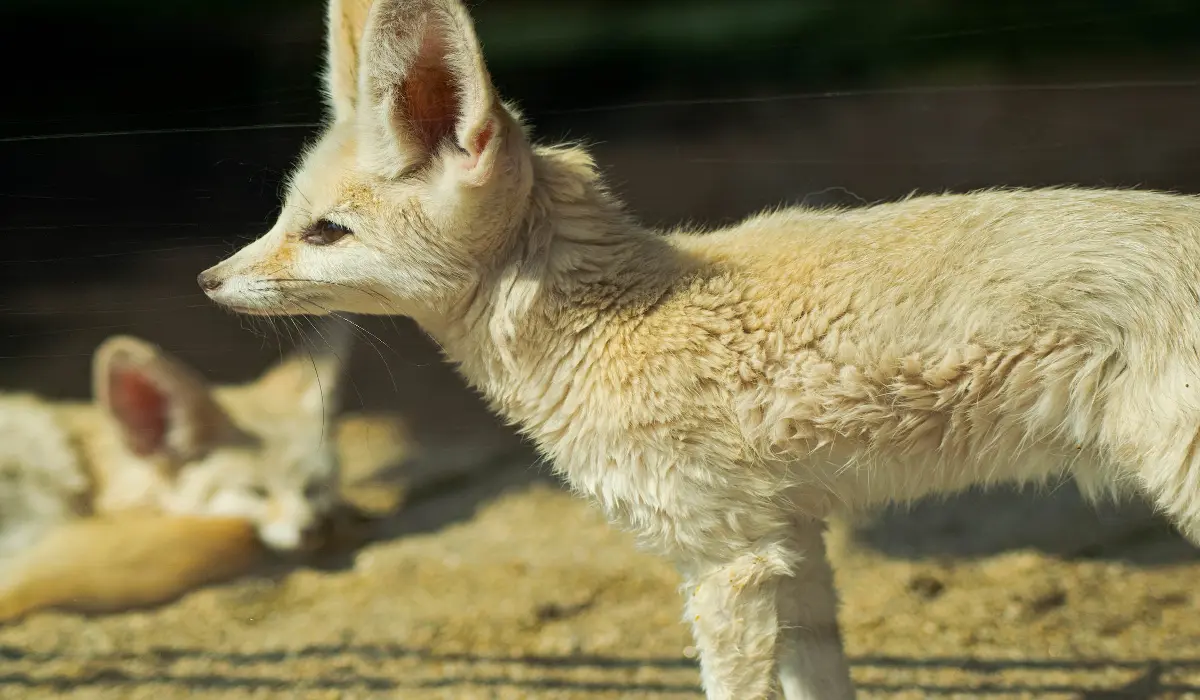The fennec fox, with its adorable, distinctive large ears and petite frame, has long been the center of fascination for animal enthusiasts and potential pet owners alike.
Recently, they have even been touted as exotic pets, particularly in the United States, leading many to ask: Are Fennec Foxes friendly?
These intriguing creatures, native to the Sahara desert and other arid regions in North Africa, have lively personalities and unique charm that draw people to them.
As an exotic pet, it is crucial to understand their behavior and friendliness, as well as their compatibility with humans.
This comprehensive guide seeks to explore the friendliness of fennec foxes and their suitability as pets in a thorough and engaging manner.
Fennec Foxes in the Wild
To understand the friendliness of fennec foxes, it is essential to delve deeper into their natural habitat and behaviors. In the wild, these nocturnal creatures thrive in a landscape that is vastly different from the human world.
They are skilled burrowers, creating intricate tunnel systems to provide shelter and protection from the harsh Saharan heat during the day and cold nights.
Their oversized ears help dissipate heat and give them extraordinary hearing abilities—vital to sensing potential threats and locating prey.
Fennec foxes are social animals that live in family groups known as “clans,” which can consist of up to 10 individuals.
A clan often comprises a monogamous breeding pair and their offspring, with the group utilizing cooperation for hunting and caring for each other’s pups.
They communicate using a wide array of vocalizations, including purrs, barks, growls, and, most peculiarly, a high-pitched excited sound, often called a “squee.”
As a result, these animals have experienced social bonds and protective instincts that play a significant role in their behavior.
Fennec Foxes as Pets – Domestic Settings
Over the years, fennec foxes have emerged as exotic pets sought after for their adaptive, intelligent, and playful disposition.
However, this transition from a wild animal to a domestic companion raises the essential question—are fennec foxes friendly?
Here are some key aspects to consider when analyzing their behavior in a domestic setting as pets:
1. Early Socialization and Bonding
Fennec foxes can develop strong attachments to humans and a friendly disposition when they are socialized at a young age.
Exposing them to positive human interactions from a few weeks old creates a foundation for trust and camaraderie.
As they mature, fennec foxes will respond to their caregivers with various vocalizations, such as purrs, whimpers, and barks, indicative of their comfort and bonding.
2. Playful and Curious Nature
Their energetic and inquisitive personalities are contributing factors to their friendly demeanor with humans.
Fennec foxes often exhibit a dog-like excitement, such as wagging their tails, fetching, and enjoying play sessions.
They will engage with toys, dig in sandboxes, and be more than willing to explore their environment.
These traits make them appealing for potential pet owners seeking a unique and interactive companion animal.
3. Cautious yet Endearing
While friendly, fennec foxes are also cautious by nature, owing to their innate survival instincts in the wild.
It may take time to gain their trust upon entering a new environment.
However, with patience and proper care, these animals have the potential to develop lasting bonds.
Challenges of Keeping Fennec Foxes as Pets
It is crucial to understand that despite exhibiting friendly behavior, fennec foxes are neither domestic animals nor easy pets to handle.
Their wild instincts still persist, and they require a specific set of conditions to thrive as pets:
- Legal Restrictions: Several states and localities in the US have laws and regulations governing the ownership of exotic animals. Therefore, it is essential for potential owners to research the legalities surrounding fennec foxes in their area.
- Intensive Care: Fennec foxes require a specialized diet, environment, and exercise regimen, demanding time, effort, and financial resources to maintain their wellbeing properly.
They also need a spacious outdoor enclosure to roam and exercise their digging tendencies. - Behavioral Issues: Fennec foxes may exhibit destructive behaviors, such as chewing on furniture, marking their territory with urine, and digging incessantly.
Furthermore, they tend to be skittish around loud noises and can become anxious when startled.
In Conclusion: Are Fennec Foxes Friendly?
Fennec foxes, with their unique and endearing appearance, have the potential to exhibit friendly and engaging behaviors with humans.
However, it is imperative to remember that they are not domestic animals, and their suitability as pets should be carefully considered.
While they can develop strong bonds with their human caregivers, exhibit playful behaviors, and adapt to a domestic environment, potential owners must be prepared to handle the challenges that accompany these exotic creatures.
Thus, before deciding to have a fennec fox as a pet, potential owners should carefully consider whether they can provide the appropriate care, environment, and patience necessary for keeping these exotic animals.
Extensive research and a thorough understanding of their needs are paramount to ensuring a harmonious relationship with a fennec fox, resulting in a nurturing environment for both them and their human companions.
